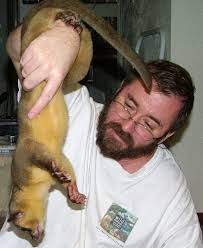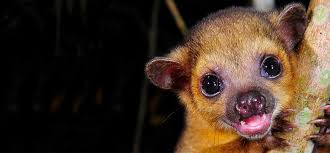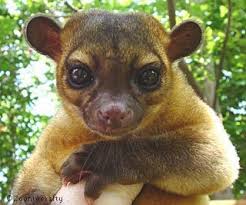Kinkajou Care (Potos flavus)
by Erica Mede, CVT
 In loving memory of our friend Kevin.
In loving memory of our friend Kevin.
Natural History
Kinkajous, often called honey bears and night walkers, are found throughout much of South America ’s rainforests. There are several subspecies of kinkajou which vary in size from 2 lbs all the way to 12 lbs in the pet trade. Kinks, as they are often called, are playful and curious arboreal exotic pets. Their nocturnal behaviors sometimes makes it difficult for folks to own as they are the most active between 7 pm and midnight with jumping, banging, vocalizing, and carrying on as their wild counterparts would.
These animals bond strongly to one particular person but generally accept other family members without issue if properly introduced and they are involved in feeding, cleaning, and socializing. Due to their strong bond, kinks make an excellent pet but as a rule they do not rehome well. Many states and individual townships have exotic animal ordinances that must be researched. Make sure all licenses and paper work are filled out properly. Although gentle by nature in their own territory, they can become incredibly rambunctious and will greet members of the family during play time with a good natured “dive bomb” from a high perch.
In captivity, kinkajous typically live 20-25 years and will go through a “terrible two” stage starting roughly around 2 years old and hopefully ending around year 5 or 6. This can be mostly avoided with neutering and spaying kinkajous. Kinks have poor eyesight but this is made up for with their excellent senses of touch and smell. Their paws on the front limbs are bare which heightens their tactile perception.
Kinkajous are not well known for being neat and tidy, especially when it comes to bathroom habits. Although they tend to relieve themselves in one or two areas routinely, they are not a latrine animal that can be litter box trained. Typically, a kinkajou will climb to the highest perch and use the bathroom.
Kinkajous, often called honey bears and night walkers, are found throughout much of South America ’s rainforests. There are several subspecies of kinkajou which vary in size from 2 lbs all the way to 12 lbs in the pet trade. Kinks, as they are often called, are playful and curious arboreal exotic pets. Their nocturnal behaviors sometimes makes it difficult for folks to own as they are the most active between 7 pm and midnight with jumping, banging, vocalizing, and carrying on as their wild counterparts would.
These animals bond strongly to one particular person but generally accept other family members without issue if properly introduced and they are involved in feeding, cleaning, and socializing. Due to their strong bond, kinks make an excellent pet but as a rule they do not rehome well. Many states and individual townships have exotic animal ordinances that must be researched. Make sure all licenses and paper work are filled out properly. Although gentle by nature in their own territory, they can become incredibly rambunctious and will greet members of the family during play time with a good natured “dive bomb” from a high perch.
In captivity, kinkajous typically live 20-25 years and will go through a “terrible two” stage starting roughly around 2 years old and hopefully ending around year 5 or 6. This can be mostly avoided with neutering and spaying kinkajous. Kinks have poor eyesight but this is made up for with their excellent senses of touch and smell. Their paws on the front limbs are bare which heightens their tactile perception.
Kinkajous are not well known for being neat and tidy, especially when it comes to bathroom habits. Although they tend to relieve themselves in one or two areas routinely, they are not a latrine animal that can be litter box trained. Typically, a kinkajou will climb to the highest perch and use the bathroom.

Diet
Kinkajous are primarily frugivores (fruit eaters) but still require a source of protein making them more omnivorous. In the wild, these animals consume fruits, nectars, some vegetation, insects, eggs, frogs, and blossoms. Generally, these animals are very sweet and docile (except around play time) but they can be very territorial around feeding time and will often let out a high pitched shriek which is their feeding call. Heavy ceramic bowls, especially ones that can be attached to the side of the cage. Likewise, a large heavy water bottle with a heavy duty sipper tube is desirable to prevent water bowls being flipped and befouled.
Typically a captive kinkajou will have a diet that consists of:
As these animals are from tropical areas all attempts should be made to feed a diet based on tropical fruits:
Kinkajous are primarily frugivores (fruit eaters) but still require a source of protein making them more omnivorous. In the wild, these animals consume fruits, nectars, some vegetation, insects, eggs, frogs, and blossoms. Generally, these animals are very sweet and docile (except around play time) but they can be very territorial around feeding time and will often let out a high pitched shriek which is their feeding call. Heavy ceramic bowls, especially ones that can be attached to the side of the cage. Likewise, a large heavy water bottle with a heavy duty sipper tube is desirable to prevent water bowls being flipped and befouled.
Typically a captive kinkajou will have a diet that consists of:
- 1-2 cups (depending on size of the kinkajou) fresh in season TROPICAL fruits
- 4-6 monkey biscuits/chow such as Zupreem Primate Dry Diet
- ¼ - ½ cup fresh in season vegetables and plant blossoms
- Protein source (insects, cooked chicken or turkey, quail eggs, high quality dog foods)
As these animals are from tropical areas all attempts should be made to feed a diet based on tropical fruits:
- Bananas (a favorite!)
- Papayas
- Mangos
- Melons
- Kiwis
- Grapes
- Pomegranates
- Cherimoyas
- Figs
Items to avoid feeding kinkajous are:
A favorite of kinkajou keepers is the “kinkajou smoothie”. This is fruits, vegetables, nectar, and juices being tossed into the blender and then frozen in ice cube trays or popsicle trays. Aloe vera juice and 100% fruit juices are excellent additions to the “smoothie”. Lightly defrost before serving.
Enclosure
Their fully prehensile tail acts as a fifth limb for climbing, playing, and general mischief. Kinkajous, due to their curious nature are often confined while their owners are gone to prevent accidental ingestion of potentially hazardous items and prevent injury as well. In theory, most adult kinkajous can be housed while owners are away in a 4 foot deep, 8 foot wide, and 6 foot tall enclosure but bigger is always better! Large macaw enclosures, especially the double wide macaw enclosures, are excellent for housing these animals.
Arboreal cages require lots of branches, shelves, ledges, and cotton ropes. Avoid chains as these can cause accidental broken digits. Kinkajous are amazingly adapted for arboreal living with their prehensile tail and their ability to turn their hind feet backwards to facilitate climbing down trees head first in a controlled manner.
Kinkajous benefit from an outdoor AND indoor enclosure. Outdoor enclosures need to be escape and predator proof and offer a shelter where the kinkajou can escape inclement weather. If the temperature drops under 60 degrees a heated area must be offered as these are tropical animals.
- Dairy. Although many advocate feeding yogurt and cottage cheese, these animals are not equipped physically to digest dairy. Essentially, kinkajous are lactose intolerant.
- Citrus. These fruits are too acidic for kinkajous to handle in large quantities. These can be fed however as treats.
- Strawberries. These fruits are not native to natural territories and there are several consistent reports of these fruits causing allergic reactions in kinkajous. Although these may be anomalies it is better to avoid feeding these fruits.
- Avocados. Although there are no reports of avocados causing issues in kinkajous directly to the author’s knowledge but other species of animals have had issues. Until further research is performed, it may be worth avoiding feeding this.
- Onions. These have been known to cause renal issues in other species and are best avoided.
- Cauliflower and Broccoli. Avoid these foods to prevent excessive gas in the gastrointestinal tract.
A favorite of kinkajou keepers is the “kinkajou smoothie”. This is fruits, vegetables, nectar, and juices being tossed into the blender and then frozen in ice cube trays or popsicle trays. Aloe vera juice and 100% fruit juices are excellent additions to the “smoothie”. Lightly defrost before serving.
Enclosure
Their fully prehensile tail acts as a fifth limb for climbing, playing, and general mischief. Kinkajous, due to their curious nature are often confined while their owners are gone to prevent accidental ingestion of potentially hazardous items and prevent injury as well. In theory, most adult kinkajous can be housed while owners are away in a 4 foot deep, 8 foot wide, and 6 foot tall enclosure but bigger is always better! Large macaw enclosures, especially the double wide macaw enclosures, are excellent for housing these animals.
Arboreal cages require lots of branches, shelves, ledges, and cotton ropes. Avoid chains as these can cause accidental broken digits. Kinkajous are amazingly adapted for arboreal living with their prehensile tail and their ability to turn their hind feet backwards to facilitate climbing down trees head first in a controlled manner.
Kinkajous benefit from an outdoor AND indoor enclosure. Outdoor enclosures need to be escape and predator proof and offer a shelter where the kinkajou can escape inclement weather. If the temperature drops under 60 degrees a heated area must be offered as these are tropical animals.

Substrate
Outdoor enclosures do best with a concrete floor. Concrete allows for quick cleaning and disinfecting while limiting exposure to parasites. Indoor enclosures should utilize linoleum flooring or similar for sanitation reasons. Bird cages with bars on the bottom that allow feces and uneaten food to fall through are appropriate as well.
Temperature
These tropical South American animals do not do well in temperatures under 60 degrees. Ideally, kinkajous should be kept between 75 and 85 degrees. A pig heater or ceramic heat emitter may be needed in the colder months. Make sure that the temperatures are controlled and the kinkajou does not have direct contact with the heating element. Keep in mind they utilize their long tails so be very careful about placement!
Humidity
The relative humidity should be kept between 50-70% for these animals. This is generally easy to maintain in a home environment. Some outdoor enclosures consist of shallow running water that will increase the humidity.
Lighting
Kinkajous are nocturnal with most of their activity from 7 pm until midnight and then an hour or two before dawn. Try to maintain a normal light cycle for these animals. This will mean leaving the lights on during the day in the room the kinkajou is in and turning the lights out around 6:30 pm. Room lights on a timer are excellent to regulate the light cycle and offers a level of predictability to avoid accidental aggression from a kinkajou that was woken up too early
Enrichment
Kinks need lots of play time and socialization with their owners! These animals require 2-3 hours of play and socialization a day to maintain a strong bond and prevent boredom and destructive behaviors. Kinkajous are similar to most larger exotic mammals and require toys and novel stimuli to prevent boredom linked aggression. Hanging wood parrot toys, ladders, PVC pipes they can fit through, and swings are must haves! Primate enrichment toys are available generally online and can be ordered for kinkajous as well. Cat “fishing rod” toys that stimulate pouncing are cherished and provide hours of entertainment as do cat trees.
Nest boxes (generally a modified Rubbermaid container or similar), sleeping sacks, and hammocks higher up in the cage are important for kinkajous to feel secure and comfortable while they rest during the day. Fleece is an excellent fabric to utilize for a kinks sleeping area. Avoid any fabric that may unravel or become tattered.
Medical Care
A qualified veterinarian for kinkajous is hard to come by. Not only do they require exotic and some large animal knowledge they also need to be capable of taking care of the pet properly.
Typically at Chicago Exotics we offer for kinkajous:
If you have any questions, please feel free to call us at 847-329-8709.
Outdoor enclosures do best with a concrete floor. Concrete allows for quick cleaning and disinfecting while limiting exposure to parasites. Indoor enclosures should utilize linoleum flooring or similar for sanitation reasons. Bird cages with bars on the bottom that allow feces and uneaten food to fall through are appropriate as well.
Temperature
These tropical South American animals do not do well in temperatures under 60 degrees. Ideally, kinkajous should be kept between 75 and 85 degrees. A pig heater or ceramic heat emitter may be needed in the colder months. Make sure that the temperatures are controlled and the kinkajou does not have direct contact with the heating element. Keep in mind they utilize their long tails so be very careful about placement!
Humidity
The relative humidity should be kept between 50-70% for these animals. This is generally easy to maintain in a home environment. Some outdoor enclosures consist of shallow running water that will increase the humidity.
Lighting
Kinkajous are nocturnal with most of their activity from 7 pm until midnight and then an hour or two before dawn. Try to maintain a normal light cycle for these animals. This will mean leaving the lights on during the day in the room the kinkajou is in and turning the lights out around 6:30 pm. Room lights on a timer are excellent to regulate the light cycle and offers a level of predictability to avoid accidental aggression from a kinkajou that was woken up too early
Enrichment
Kinks need lots of play time and socialization with their owners! These animals require 2-3 hours of play and socialization a day to maintain a strong bond and prevent boredom and destructive behaviors. Kinkajous are similar to most larger exotic mammals and require toys and novel stimuli to prevent boredom linked aggression. Hanging wood parrot toys, ladders, PVC pipes they can fit through, and swings are must haves! Primate enrichment toys are available generally online and can be ordered for kinkajous as well. Cat “fishing rod” toys that stimulate pouncing are cherished and provide hours of entertainment as do cat trees.
Nest boxes (generally a modified Rubbermaid container or similar), sleeping sacks, and hammocks higher up in the cage are important for kinkajous to feel secure and comfortable while they rest during the day. Fleece is an excellent fabric to utilize for a kinks sleeping area. Avoid any fabric that may unravel or become tattered.
Medical Care
A qualified veterinarian for kinkajous is hard to come by. Not only do they require exotic and some large animal knowledge they also need to be capable of taking care of the pet properly.
Typically at Chicago Exotics we offer for kinkajous:
- Exams. We offer yearly (annual) routine exams as well as exams for any problems or concerns.
- Vaccinations. We recommend starting vaccinations at 6-13 weeks old and repeating 3-4 weeks later. A yearly booster of vaccinations are strongly recommended for uninterrupted vaccinations. We use Imrab-3 to vaccinate against rabies and Nobivac Puppy DPv to vaccinate against canine distemper and parvovirus. It is also strongly recommended to vaccinate against feline distemper (panleukopenia).
- Deworming. We strongly encourage deworming new kinkajous as well as those allowed access to the outdoors once a year.
- Surgeries. We offer routine neuters and spays as well as crisis intervention surgeries (laceration repair, etc). Neuters and spays should ideally be performed between 6 months and a year old.
- Nail Trimming. Kinkajou nails can become sharp and can be clipped as needed to prevent scratches and cuts but should not be cut short as this will negatively affect their ability to climb.
- Dental Care. We offer an array of dental care as needed.
- De-Clawing. We do not perform de-claws on kinkajous. This surgery is unnecessary in the normal kinkajou (exceptions would be removing one claw from a broken toe) and has a negative effect on their quality of life. A kinkajou that can not climb will develop behavior issues as well as other health concerns. Kinkajous do not have the ability to retract their claws like a cat. Their nails/claws are fused to the last half of their toes/fingers. In order to remove the claws you would have to remove part of their digits. This is akin to removing the portion of a human finger that houses the nail.
- Canine Removal. We will not remove the canines of a healthy kinkajou to prevent biting. Young kinks will bite when they are learning to play but can be taught not to. Canine removal will only be performed if the canines are fractured or there is a medically necessary reason.
If you have any questions, please feel free to call us at 847-329-8709.
